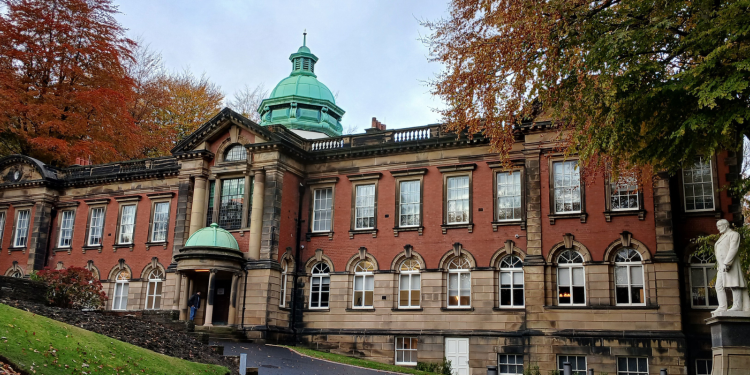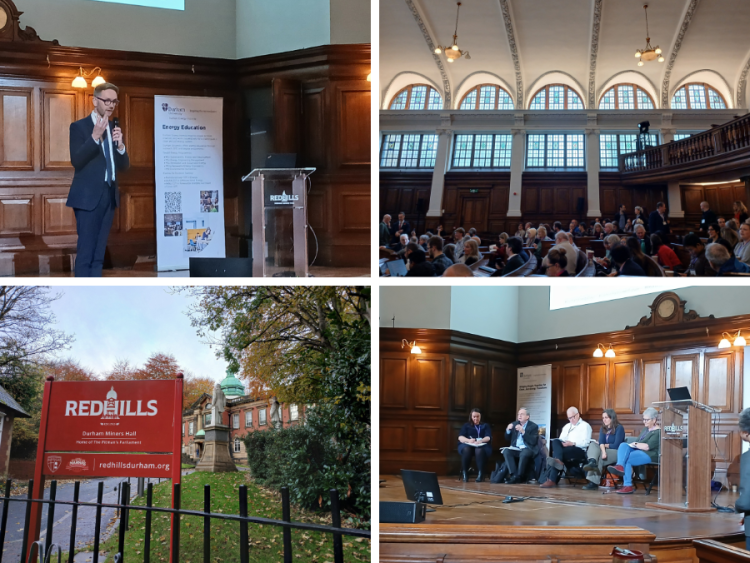Future of energy discussed at former coalminers' parliament

"Decarbonisation mustn't mean deindustrialisation"
This was the message from Chris McDonald, the Department for Energy Security and Net Zero's minister for industry, in his speech to an event in a former miners' parliament.
The Labour MP for Stockton North was among the speakers at the Durham Energy Days 2025 conference, organised by Durham University's Energy Institute.
Team Salix was among around 200 people who attended the two-day event, including academics, industry experts and campaigners.
Speeches, discussion panels and activities at the event focussed on topics including electrification, wind power, community energy, after coal, geothermal and low-emissions farming.

Clockwise from top left: Chris Stark CBE, the audience in the Pitman's Parliament, a panel discussion on energy transition's effect on communities and the Redhills Durham Miners Hall, Durham City.
"Without displacing fossil fuels and acting on net zero we will regret it"
One of the keynote speeches of the opening morning of the conference came from Chris Stark CBE, head of the UK's mission for clean power with the Department for Energy Security and Net Zero, who declared "you can't pretend climate change is not happening."
He talked about the growing potential for droughts, floods and wildfires caused by global warming as he called for "an orderly path to net zero," adding that "I can see us moving away from net zero as political terminology, but the science doesn't go away."
"We have a tremendously exciting future ahead. We need to put the conditions in place to move as quickly as possible for climate reasons but also economic reasons," he told the audience in the Pitman's Parliament.
"We are not paying attention to what is happening in other parts of the world. China is moving towards being a more electrified economy at a staggering pace and has rolled out more electric vehicles than rest of the world combined. A policy of displacement wins. China is actively displacing fossil fuels. We need to create incentives to using clean energy."
He also talked about using gas "differently" and "far less" without phasing it out completely for now, stressed the importance of building grid so we can meet our future need for electricity, and called for the country to turn national clean power goals into regional ones.
"Without displacing fossil fuels and acting on net zero we will regret it," he concluded as he called for "more positive discussion generally" around the issue.
I've never met a miner who wanted their son to be a miner, but people miss the sense of pride and community cohesion.
In his speech to the conference, Chris McDonald MP described how the public are "suffering from high energy prices" as he stressed that solar and offshore wind are the cheapest forms of power and declaring "we want to be a world leader in clean energy."
"I've never met a miner that wanted their son to be a miner, but people miss the sense of pride and community cohesion," he told the audience in the grade II listed building where the views of the coal industry had once been heard, with mining having provided 250,000 jobs in the North East.
"We want to be a world leader in clean energy, which will provide well-paid, long-term jobs." Mr McDonald added, citing that the green economy is growing three times faster than the economy in general and talking up the potential of geothermal heat and district heating.
"Oil and gas have provided good jobs, but green industry jobs will be spread much more evenly around the UK. The government's clean energy plans are estimated to bring 20,000 jobs to the North East by 2030.
"If we use natural resources to create the clean energy of the future we will create the clean energy jobs of the future. Decarbonisation mustn't mean deindustrialisation."
Other events at the Energy Day 2025 conference included a panel discussion on energy's impact on communities, with speakers including Helen Stockton from the charity National Energy Action and Lucie Middlemiss from the School of Earth and Environment at Leeds University, who is co-author of the book Just Climate Futures. Both talked about the importance of hearing the voices of the fuel poor in energy policy.
Durham University's Professor Jon Gluyas from the Department of Earth Sciences and Dr Charlotte Adams from the National Centre for Geothermal Energy also led a session on the huge potential of minewater geothermal energy.



